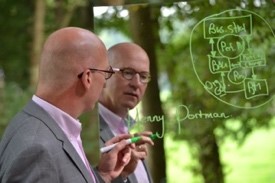Sensemaking in the Agile Forest
SERIES ARTICLE
By Henny Portman
The Netherlands
Introduction
The product backlog gives you a first indication of the product owner maturity of the organization. And especially the length of the product backlog is significant. Saying ‘no’ to wishes is one of the most important competencies of the ideal product owner. If a product owner always says ‘yes’ to wishes, the backlog will be more of a waste bin. If everything ends up on the backlog, it will be far too long. That makes a backlog difficult, if not impossible to prioritize. And a lack of priorities is at the expense of the Agile team’s strength and added business value. Such a product owner might better be called a ‘backlog secretary’, ‘clerk’ or ‘shopping list manager’. Product Owners are the voice of the customer that needs to be an entrepreneur of their product.
Scrum guide
As described in the Scrum Guide[1], the Product Owner is accountable for maximizing the value of the product resulting from the work of the Scrum Team. How this is done may vary widely across organizations, Scrum Teams, and individuals.
The Product Owner is also accountable for effective Product Backlog management, which includes:
- Developing and explicitly communicating the Product Goal.
- Creating and clearly communicating Product Backlog items.
- Ordering Product Backlog items; and,
- Ensuring that the Product Backlog is transparent, visible, and understood.
Is the Product Owner part of business or part of IT?
It’s easy to say that this doesn’t matter if they fulfil their role. But in my experience, the Product Owner is someone from business rather than IT. You must give business people the control over the product’s vision, features and prioritization to maximize business outcomes. They can make business decisions. IT can make the technical decisions. I have seen catastrophic project failures where IT took the role of the Product Owner. The business was very unhappy with the results, it was lacking their feedback, or they didn’t even have the change to give feedback.
Fix it with a training course?
However, it’s not the case that you can send a potential business product owner to a product owner training course, and everything will be fine. In addition to product owner competencies, about which more later, there are also necessary organizational competencies.
Receiving a mandate
The organization, read the management, must give the product owner sufficient mandate to be able to make decisions independently. Without this mandate, a product owner cannot say ‘no’. Management must support the product owner and his product vision. If a product owner says ‘no’, it is ‘no’. When management overrules this decision, the product owner is out of the game. The organization will also have to give the product owner sufficient space to carry out the role of product owner. You are not a product owner for a few hours a week; it is important that you are always available to the team and to stakeholders so that no delays occur. Decision latency is one of the key reasons for project failure. You could also classify these competencies under the agile mindset of an organization.
More…
To read entire article, click here
Editor’s note: This is the second article in a series by Henny Portman, one of the world’s leading authorities on “agile”. Based in The Netherlands, Henny coined the term “agile forest” in 2019 to describe the many agile frameworks that have emerged over the last 20 years. This series is intended to help readers better understand the agile concept, navigate through the ‘underbrush’ and more successfully apply whichever framework is selected for their projects.
How to cite this article: Portman, H. (2022). The ideal Product Owner, Sensemaking in the Agile Forest series, PM World Journal, Vol. IX, Issue IV, April Available online at https://pmworldlibrary.net/wp-content/uploads/2022/04/pmwj116-Apr2022-Portman-4-the-ideal-product-owner.pdf
About the Author

Henny Portman
The Netherlands
![]()
Henny Portman, owner of Portman PM[O] Consultancy and was partner of HWP Consulting, has 40 years of experience in the project management domain. He was the project management office (PMO) thought leader within NN Group and responsible for the introduction and application of the PMO methodologies (portfolio, program, and project management) across Europe and Asia. He trains, coaches, and directs (senior) programme, project and portfolio managers and project sponsors at all levels, and has built several professional (PM(O)) communities.
Henny Portman is accredited in a variety of qualifications, including P3O, PRINCE2, MSP, MoP, PRINCE2 Agile, AgilePM, AgilePgM and AgileSHIFT trainer and an SPC4 SAFe consultant and trainer. He is a P3M3 trainer and assessor and PMO Value Ring Certified Consultant (PMO Global Alliance). On behalf of IPMA, he assesses mega and large projects for the IPMA Project Excellence Award. In addition to this, he is an international speaker, author of many articles and books in the PM(O) field, and an active blogger (hennyportman.wordpress.com).
Henny can be contacted at henny.portman@gmail.com
To view other works by Henny Portman, visit his author showcase in the PM World Library at https://pmworldlibrary.net/authors/henny-portman/
[1] https://scrumguides.org/scrum-guide.html









